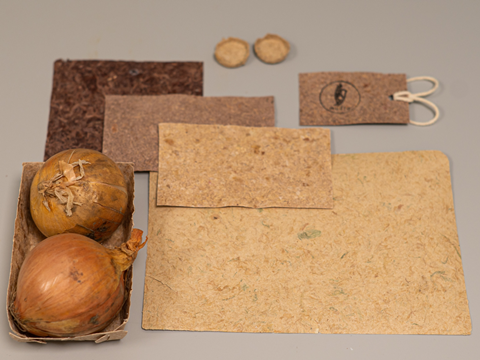
Home-compostable packaging materials made from onion skins have been launched by HUID in hopes of reducing the amount of fossil plastics in household waste.
Reportedly, up to 400kg of onion skins go to waste every week; most are thought to be ground into cattle feed. Meanwhile, it is believed that 90 billion pieces of plastic packaging are discarded among UK households every year.
HUID’s new solution aims to tackle both waste streams. Onion skins already have antimicrobial properties, the company says, meaning the subsequent packaging is expected to help extend the shelf life of perishable foods.
Cellulose is extracted from the onion skins and combined into a biopolymer blend. This results in a film said to offer a similar mechanical strength to traditional plastic solutions.
Two prototypes currently exist: Cellofil, a flexible film, and Pyber, which the company compares to cardboard. This rigid alternative is set to be launched in mid-2025.
Both were developed using mechanical tests from the University of Strathclyde’s Advanced Materials Research Laboratory (AMRL), as well as the National Manufacturing Institute of Scotland (NMIS)’s life cycle assessment process. Apparently, this has confirmed the packaging’s environmental footprint, functionality, and performance.
“Onion skins are nature’s own form of packaging, protecting the onion below from harm and are a plentiful waste source,” explained HUID founder Renuka Ramanujam. “Yet, after speaking to various scientists I realized that no one was using them as a material and spotted a gap in the market for a new variety of eco-friendly packaging.
“Working with NMIS and the AMRL has been instrumental in refining our products and gaining the validation we need to show buyers and consumers that the compostable packaging meets the same standards they might expect from single-use plastic or cardboard.
“Scotland boasts an excellent startup community with universities and other networks like Scottish EDGE and IBioIC providing businesses with crucial support in their early stages. They’ve not only helped me access expertise and funding but have also connected me with key industry partners and a talented pool of interns and potential employees eager to get involved with HUID and sustainable biotechnology.”
Aineias Karkasinas, Sustainability Engineer at NMIS, continued: “Our collaboration with HUID perfectly illustrates where NMIS can add value by helping transform manufacturing practices. NMIS champions sustainable solutions and supports small and medium-sized businesses through providing them with access to expertise and equipment they may not have in-house.
“HUID’s creative use of onion skins minimizes waste and is a great response to the current market need for sustainable packaging. It has been great to support the development of genuinely sustainable solutions and provide HUID with deeper insights into the environmental performance of its materials.”
“We have been working closely with HUID for over two years, supporting its product development with consultancy in materials properties and performance,” added Dr Tiziana Marrocco, Knowledge Exchange manager at AMRL. “It is so rewarding to see how far the business has grown since the early steps and knowing that our collaboration carries such a relevant societal message.”
NMIS is supporting the HUID team at its new lab and office space, where it plans to develop its compostable packaging concept. NMIS is operated by the University of Strathclyde and froms part of the High Value Manufacturing Catapult (HVMC).
AMRL is also conducting ‘rigorous’ testing on the onion skin-based packaging materials.
Innovate UK recently granted the start-up £150,000 (€179,141.44) to develop its manufacturing and processing methods. In addition, The Grantham Institute and Imperial College London’s climate tech accelerator programme, The Greenhouse, has awarded HUID £20,000 (€23,875.90).
Other companies have also sought to convert food waste into packaging, including Ecoshell with GEX – a packaging solution made of bio-calcium derived from eggshells. The resultant packaging is certified as recyclable and, compared to virgin plastics, claims to reduce plastic by up to 50% and carbon by up to 70%.
Notpla’s seaweed-based packaging – declared by the Dutch government to be ‘plastic-free’ in line with the EU’s Single-Use Plastics Directive – has recently completed a £20 million (€23,924,400) Series A+ fundraising round, doubling its initial target. Now the company intends to expand its presence in the American market and replace over 100 million single-use plastic items annually by 2026.
If you liked this story, you might also enjoy:
The ultimate guide to the Packaging and Packaging Waste Regulation in 2024
How are the top brands progressing on packaging sustainability?
Sustainable Innovation Report 2024: Current trends and future priorities
Everything you need to know about global plastic sustainability regulation













No comments yet